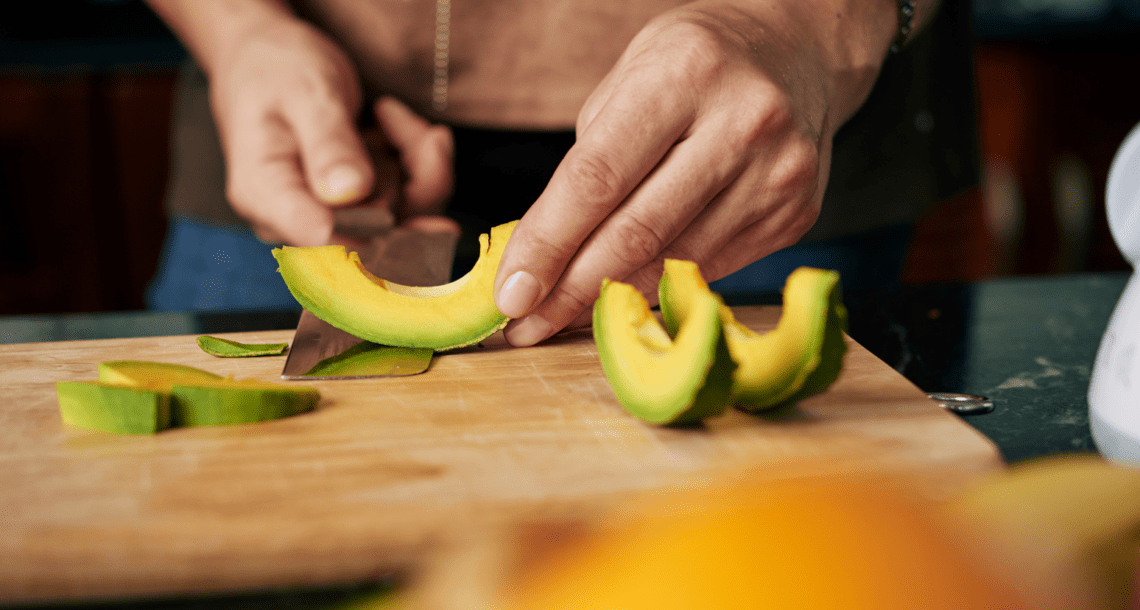
Keto isn’t a fad or a passing trend; it’s a beneficial, natural, evidence-based way of eating that shifts your metabolism into a state called ketosis. A ketogenic diet involves lowering your intake of carbohydrates, consuming moderate protein, and eating moderate-to-high fat. The standard American diet is surprisingly high in carbohydrates and low in healthy fats. Starting keto flips the focus to good quality protein and fat as your main sources of calories.
When you lower your carbohydrate intake enough, your body switches from burning glucose and carbohydrates for fuel to burning fats instead. Your body increases the breakdown of fat and starts producing ketones–molecules that are known to be advantageous for wellness and performance. Let’s talk about how to start keto by shifting the proportions of macronutrients you consume.
What Are Macros?

Macronutrients or macros refers to the nutrients your body uses in relatively large amounts for fuel every day. Macronutrients are split into three categories: fat, protein, and carbohydrates.
Carbs are the starches, sugars, and fibers typically found in grains, fruits, and veggies. Proteins are comprised of amino acid building blocks. Protein is responsible for building and repairing your cells and tissues, including your skin, hair, muscles, and bones.
Fat is made up of fatty acids that provide lasting energy. Fats help regulate your hormones, absorb vitamins, and more. There are different types of fats. Many people on a standard American diet are lacking in healthy natural fats due to their low-fat diet or because they’re eating too many of the wrong types of fats, such as trans fats.
The standard American diet is far from balanced and typically high in carbohydrates, especially processed and refined carbohydrates like white-flour cupcakes, pasta, and sugary soda. Macros differ on a ketogenic diet, with 5-10% of your calories from carbohydrates, 15-30% from protein, and 60-80% from fat. This means the soda and wheat cupcakes are off the menu! Check out the recipes section here at Ketogenic.com for delicious keto recipes to replace your old carb-heavy comfort foods!
Of course, the quality of the food you consume on keto always matters. Aim for a well-formulated ketogenic diet focusing on natural and unprocessed whole foods.
What Are the Benefits of Keto?
It’s no wonder people start keto for weight loss, with some studies showing it’s possible to lose up to four and a half pounds a week! [1]
But the benefits of a ketogenic diet don’t just start and stop with weight loss; here are some of the other positives and reasons to consider a keto diet:

- Improved energy and mental focus
- Decreased appetite (feeling fuller for longer)
- Improved body composition (lowering fat mass and maintaining or gaining muscle)
- Increased endurance and performance
- Lower inflammation
- Increased fat oxidation
- Anti-aging and longevity
- Headaches and migraines
A ketogenic diet has shown promise in improving a range of conditions, including:
- Depression and anxiety
- Polycystic ovarian syndrome (PCOS)
- Autoimmune conditions like Crohn’s disease and multiple sclerosis
- Cancer
- Parkinson’s disease
- Autism
- Alzheimer’s disease
- Traumatic brain injury (TBI)
- Epilepsy
- Cholesterol and triglycerides
- Diabetes
Getting Started on Keto
It’s easy to overthink and overcomplicate going keto. Start simply by cleaning out the “carbage” and temptations from your fridge and pantry. Try to donate them to someone in need or put them in a special drawer for your children or spouse. Just dropping your sugar intake means you’re on the right track, so be kind to yourself. If you’re interested, our keto calculator can help you calculate your calories and macros; otherwise, you can just dive right in with a keto grocery list and a few easy recipes. You might find the tools here at Ketogenic.com to be useful as you transition to this way of eating; like the keto custom meal planner.
References
H. Kasper, H. Thiel, M. Ehl. Response of body weight to a low carbohydrate, high fat diet in normal and obese subjects. The American Journal of Clinical Nutrition, Volume 26, Issue 2, February 1973, Pages 197–204, https://doi.org/10.1093/ajcn/26.2.197








